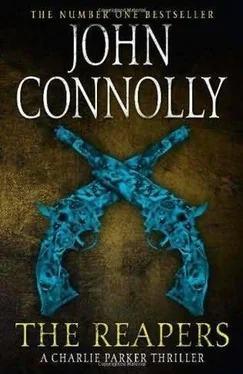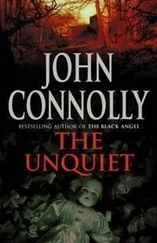There was a splinter in his eye. He couldn’t leave it there. You couldn’t leave a splinter in your eye. It was just…wrong.
Benton held his hands before him and turned them sideways, one palm facing the other. He drew them toward him until they were almost touching his head, one at either side of his damaged eye. Then, slowly, he brought his index fingers together until they touched the splinter. The pain was still ferocious, but this time he had been expecting it. He tightened the tips of his fingers against the shard of wood, and pulled. It was buried deep, so there was some resistance, but Benton didn’t stop. There was a noise like sirens in his head, high-pitched and intense, and it was only when the splinter had come free and something warm was trickling down his cheek that he realized it was the sound of his own screams.
He examined the splinter, holding it close to his left eye. It was almost two inches long, and nearly half of its length was coated in blood and ocular fluid. Sons of bitches put a splinter in my eye, he thought. He was going to get them for that.
Benton got to his feet. He found his rifle, half hidden beneath Quinn’s remains, and picked it up. His brain didn’t seem to be working the way it should. It wasn’t sending the right messages to his limbs, causing him to stumble and drift as he walked. Still, he managed to leave behind the ruins of the barn while falling to his knees only once. He had already forgotten his burns and the remains of Quinn, and the fate of Roundy did not even impinge upon his shattered consciousness. All that mattered was the splinter that had blinded him in one eye. After all, what kind of men would blind another man? Men who didn’t deserve to live, that was what kind.
Somewhere in the distance, he saw two shapes moving, one tall, the other shorter. He began following the men.
The Detective had gone only a mile in the direction of the explosion when the first car appeared. It was a red Toyota Camry, moving away from them at speed. Willie’s hand tightened on his gun, even as the Detective eased up on the gas, allowing the men to pull farther ahead. Behind them, Jackie Garner and the Fulcis also slowed down.
“You got any plans for when we get there?” asked Willie.
“The same plan as earlier: not dying.”
Thick clouds of smoke were now drifting across the road. It made driving difficult, but it also meant that they would be hidden from the men before them. As it was, they almost drove into them as they reached the site of the explosion. The red car seemed to materialize out of nowhere, stopped with its front doors open, two men still sitting in the front seats. The Detective braked sharply and went right as soon as they came in sight and, behind them, Tony Fulci swung the wheel of his truck to the left, taking it around the Mustang and bringing it to a stop almost level with the men in the car.
Unable to open his door because of the proximity of the Fulcis’ truck, the driver had simply decided to begin shooting, but because of the size of the truck he had to wind down his window and stick his hand out to hit anything. By the time he had managed to do all of that, Tony had fired four shots through the roof of the car, and the driver collapsed sideways, his left hand hanging uselessly from the half-open window, his gun lying on the ground beneath it.
The passenger, clearly wounded but still able to hold a gun, opened the door farthest from the Fulcis and tumbled out, coughing loudly, his eyes streaming from the smoke. The Detective hit the accelerator of the Mustang. The car shot forward, striking the gunman’s lower body and cutting the door from the Toyota. The force of the impact doubled the passenger over at the waist and sent him sailing onto the hood of the Mustang. He fell off as the Detective swung the wheel to the right and stopped the car. The Detective opened his door and stepped out into the smoke and rain, Willie following.
Now there were two men running from the direction of the fire. Both wore yellow slickers and jeans, the slickers standing out even in the smoke, and both carried what looked like shotguns. Willie saw them before anyone else. He tried to speak, but the smoke entered his mouth, causing him to splutter instead. Jackie Garner and one of the Fulcis were still getting out of the truck, and Parker was kneeling beside the man on the ground.
Willie raised the Browning.
I don’t want to do this. I believed that I could, but I was wrong. I thought that we’d be in and out, that we’d find Angel and Louis and get them away from here. I didn’t believe that there would be all of this, this killing. I’m not a killer. I don’t belong here. I’m not these men. I can never be.
The smoke drifted, carried by the breeze, and the figures in yellow disappeared from view for an instant.
Go away. Just turn back. Lose yourself in the smoke. Let this be the end of it.
And then they were back, closer now. He heard shots and saw muzzle flares in the smoke. Willie fired twice at the man on the left, aiming at his upper body. The man dropped to the ground and didn’t move again. A fusillade of shots came from the direction of the Fulcis’ truck, and the second man joined the first. Willie saw Jackie Garner and Tony Fulci move toward the fallen men, Tony covering Jackie as he removed their weapons and checked for any signs of life. The Detective was now looking at the driver of the car. Paulie Fulci joined him, and Willie heard the Detective tell Paulie that the driver was dead, and the other man soon would be. All four of them then began walking in the direction of the ruined barn, but Willie did not join them. He walked over to where the man whom he had killed lay spread-eagled on the ground. One shot had missed him entirely, the other had taken him in the chest. He looked to be in his forties, an overweight, balding figure wearing cheap denims and worn work boots.
Willie put his hands on his knees, leaned down, and tried not to throw up. Stars burst before his eyes. He felt anger, and grief, and shame. He moved upwind of the drifting smoke and sat beneath a tree. The rain was easing, and the tree didn’t offer much shelter in any case, but Willie didn’t trust his own body to hold him up. He leaned back against the bark, tossed the Browning aside, and closed his eyes.
He stayed that way until he heard footsteps. The Detective was approaching. His face was blackened with smoke. Willie guessed that he must have looked just the same.
“We have to keep moving,” said the Detective. “There’ll be others looking for them as well.”
“Is it worth it?” asked Willie. “All of this, is it worth it?”
“I don’t know,” said the Detective. “I just know that they’re my friends, and they’re in trouble.”
He reached out a hand. Willie took it.
“You’ll need your gun,” said the Detective.
Willie stared at the gun on the ground.
“Pick it up, Willie,” said the Detective, and in that instant Willie hated him.
But he did as he was told. He picked up the gun, and joined the others.
Benton heard the gunfire behind him, but he didn’t look back. It was all that he could do to keep moving forward. He was afraid that if he turned around, even for a moment, he would lose all sense of direction, and if he stopped he would surrender any possibility of further movement. All that he could do was to put one foot in front of the other, to maintain his grip on the rifle in his right hand, and eventually he would reach the men he was hunting. Slowly, the connections in his brain were dying, shorting out one by one like overloaded fuses. He could barely remember his own name, and had forgotten entirely the names of the men who had died in the inferno. All he knew was that those responsible for all of it, whatever it was, were ahead of him, and he needed to kill them. Once they were dead, he could stop moving, and then the pain would cease as well. Everything would cease. There would be no pain, no pleasure, no memories. There would be only blackness, like drowning in a warm sea at night.
Читать дальше












